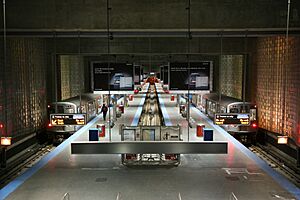O'Hare station train crash facts for kids

On March 24, 2014, a passenger train on the Chicago Transit Authority (CTA) Blue Line had an accident. The train went past the end of the tracks at the O'Hare International Airport station, hitting the bumper. This accident caused injuries to 34 people and resulted in over $11 million in damage.
Contents
Understanding the O'Hare Train Accident
This section explains what happened during the train accident at O'Hare Airport.
What Happened on March 24, 2014?
The accident happened when a Blue Line train arrived at the O'Hare International Airport station. Instead of stopping, the train continued past the platform and hit the bumper at the very end of the track. This caused a sudden stop that injured many passengers.
How Fast Was the Train Going?
Initially, some people thought the train was going too fast. However, later estimates showed the train was moving at about 25 to 26 miles per hour (40 to 42 km/h) when it entered the station. This speed was not considered too fast for that area at the time.
Emergency Response to the Accident
After the accident, many emergency workers quickly arrived to help. More than 50 firefighters and paramedics were on the scene. They worked to help the injured passengers and make sure everyone was safe.
Why Did the Train Accident Happen?
Learning the cause of the accident helps prevent similar events in the future.
The Cause of the O'Hare Train Incident
The main reason for the accident was that the train operator, Brittney Tysheka Haywood, who was 25 years old, fell asleep while controlling the train. This meant she could not stop the train in time before it reached the end of the tracks.
Changes After the Accident
Train companies often make safety improvements after accidents.
New Safety Measures for CTA Trains
Because of this accident, the CTA made important changes to improve safety. They lowered the speed limit for trains entering the O'Hare station. The speed limit was reduced from 25 miles per hour (40 km/h) to 15 miles per hour (24 km/h). The area where this lower speed limit applies was also made longer, giving trains more space to slow down before reaching the station.

